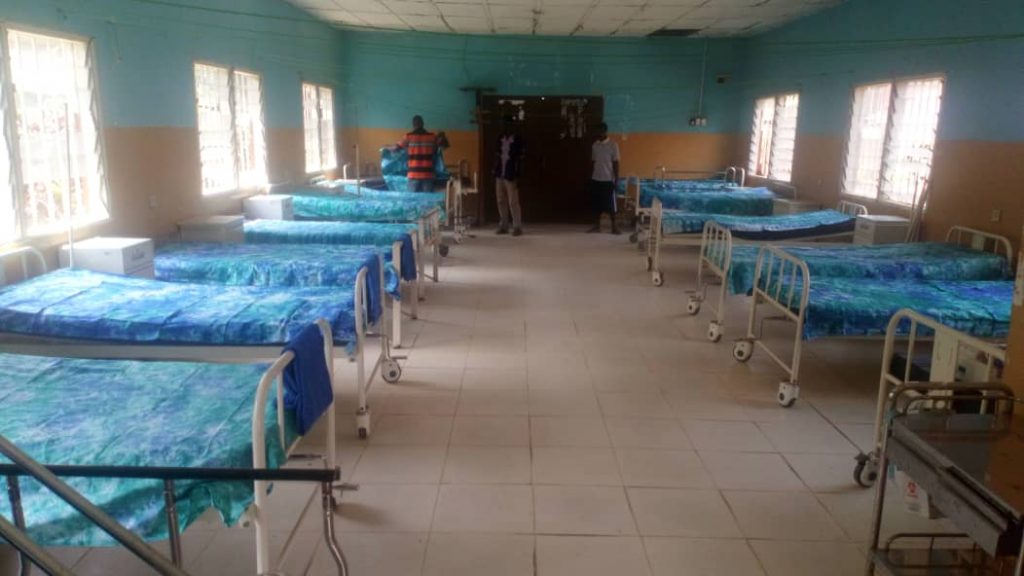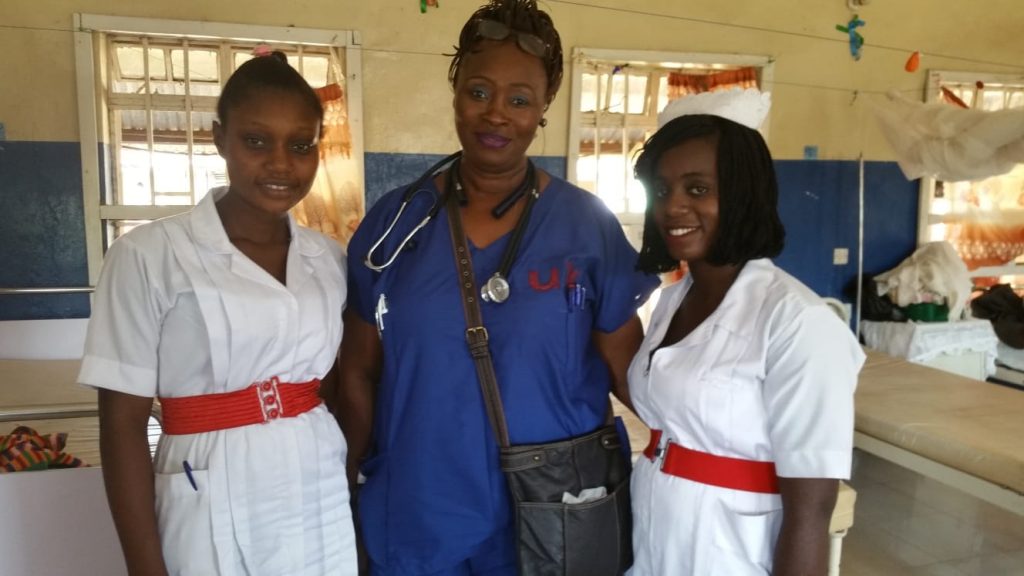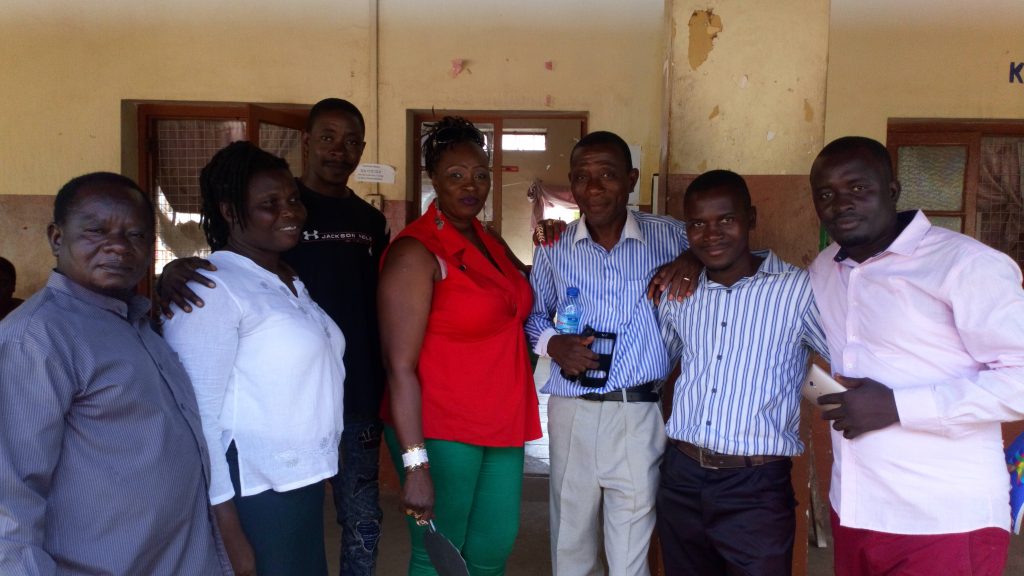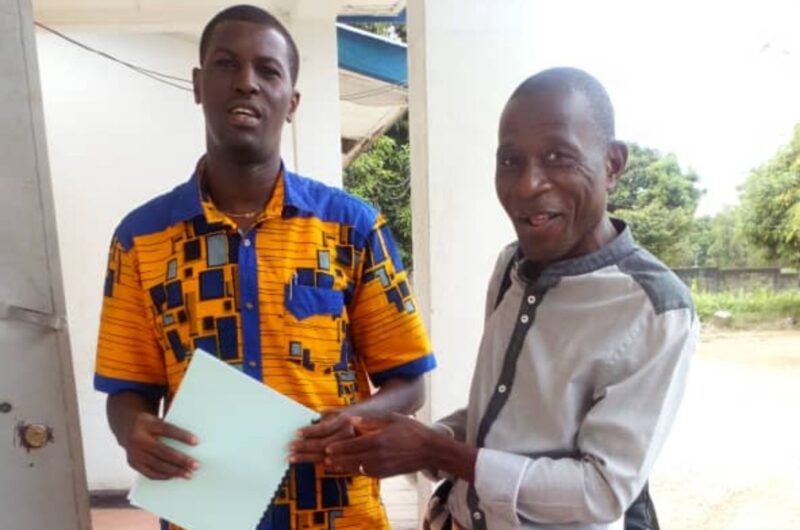We chatted to CGHP grant recipient Patrick Lebbie. Patrick is a retired stroke Nurse Specialist, who was based on the R2 Accustroke unit at Cambridge University Hospitals. Patrick originally hails from Sierra Leone, and upon retirement decided to dedicate his time to establishing a stroke unit in Bo.
This is Patrick’s story.
“Ispent the first 30 years of my life in Sierra Leone. Ever since I was young there were two things I wanted to be, a priest, or a healthcare worker. I was offered a scholarship for a master’s degree in Reading. Friends and family encouraged me, saying, ‘there is war [1], we don’t want you to die and there is no work for you here’. So, I took the opportunity and moved to the UK.

Specialising in Stroke
There were two reasons why I chose to specialise in stroke nursing. Sadly, during my training, my mother had a stroke in Sierra Leone. This was during the war, so it wasn’t easy. She was admitted to Connaught hospital and she got better.
When I came to work in London, I spent time on the stroke rehab unit and got real fulfillment. You are caring for patients as they arrive seriously ill, then we start doing rehab with them and they get better. There was a gentleman who had to start a job in December and was so looking forward to it. He was crying, saying he would never fulfill that role now that he’d had a stroke. Slowly he managed to recover and eventually he started his new job. He was so happy, and we were too. I became so interested in how patients can ‘come back’, and what they can achieve after a stroke with the correct rehabilitation.
When did you first become in involved in global health?
I was going for lunch and spotted an Addenbrooke’s Abroad (now Cambridge Global Health Partnerships) banner. I wanted to know more, so went and listened to their talk. I learnt about a team, led by Consultant Cardiologist Mark Belham, who were going to Sierra Leone to scope cardiac services. I applied and joined the scoping visit in 2014. We went from the capital to three provincial government run hospitals, and finally met with the Ministry of Health. Then Ebola broke out, and we couldn’t continue.
In April 2016 I retired, after many years working as a band 6 stroke nurse specialist. It was at my retirement send-off that I announced my plan to develop stroke services in Sierra Leone. I thought, can’t we start something like this is Sierra Leone? This is what I have been working on ever since.
Stroke services in Sierra Leone
The 11-year war ended in 2002, leaving no good healthcare system in place. But there are organisations and links such as King’s Sierra Leone Partnership, working to change this.
Currently, there are no specialist stroke nurses or doctors. There are only 20 physiotherapists for the entire country, which has a population of 7.6 million. There are approximately 5 occupational therapists, and no speech and language therapists. You will see stroke patients on general wards.
Geography is also a problem, and one of the reasons why I selected Bo as the place to develop a specialist unit. Bo is at the centre of the country, and the second largest city in Sierra Leone. The country now has a good network of roads. If someone has a stroke in Freetown where there is no stroke unit, within 3 hours they are in Bo. Stroke protocol states that patients must be seen by a healthcare professional within 4.5 hours, this is the window of opportunity. This makes Bo perfectly located.


1) Hospital beds in Bo.
2) Fellow volunteer and NHS nurse, Janet Bockaire (center), with two nurses in Bo.
What’s your vision for the partnership project?
First, I want to say that CGHP support has been great and I would like this partnership to go from strength to strength. I am also keen to include the Stroke unit here at CUH. I recently met with Nurse Stroke Specialist Consultant, Dianna Day, who is supporting in the development of this partnership.
We need to link with the Ministry of Health. They need to fund stroke specialist staff, and when they agree this will be a big relief for me as I know the unit will survive. We don’t have an endless pot of money, so need sustained government support. The government must take ownership in caring for their people.
I also would like to secure health partnership funding. This will support training, resources and development.

What are your first steps for the project? How will you train staff?
I will be in Sierra Leone for 10 months. I will have minimal outgoing costs, as won’t have to pay rent and have an old banger, a Freelander, which can get me from A to B.
First, I will have to ‘pitch a tent somewhere’, offering some basic stroke education and my plans for health care professionals. This could be in church or mosque for example. Then I will hire a training room and invite those interested to learn more. I am not promising I will be able to give people a job, but I will offer to train them with a view to having 5/6 healthcare workers who would be government funded on the stroke unit.
To start with, training will include simple things such as basic patient positioning, how to asses a patient, whether they can swallow, etc. Those trained will cascade train, using a train the trainer model. Then when they attend a patient, they can say ‘ooh, I think this is a stroke, now I know what to do’.
The civil war in Sierra Leone lasted 11 years, starting in 1991. Around 50,000 people lost their lives.
Patrick has received a grant as part of the CGHP grant scheme to facilitate a scoping visit to Sierra Leone. CGHP continues to support Patrick in the development of this partnership. If you are interested in the CGHP grant scheme, get in touch with the team at cambghp@act4addenbrookes.org.uk.
Return to case studies

